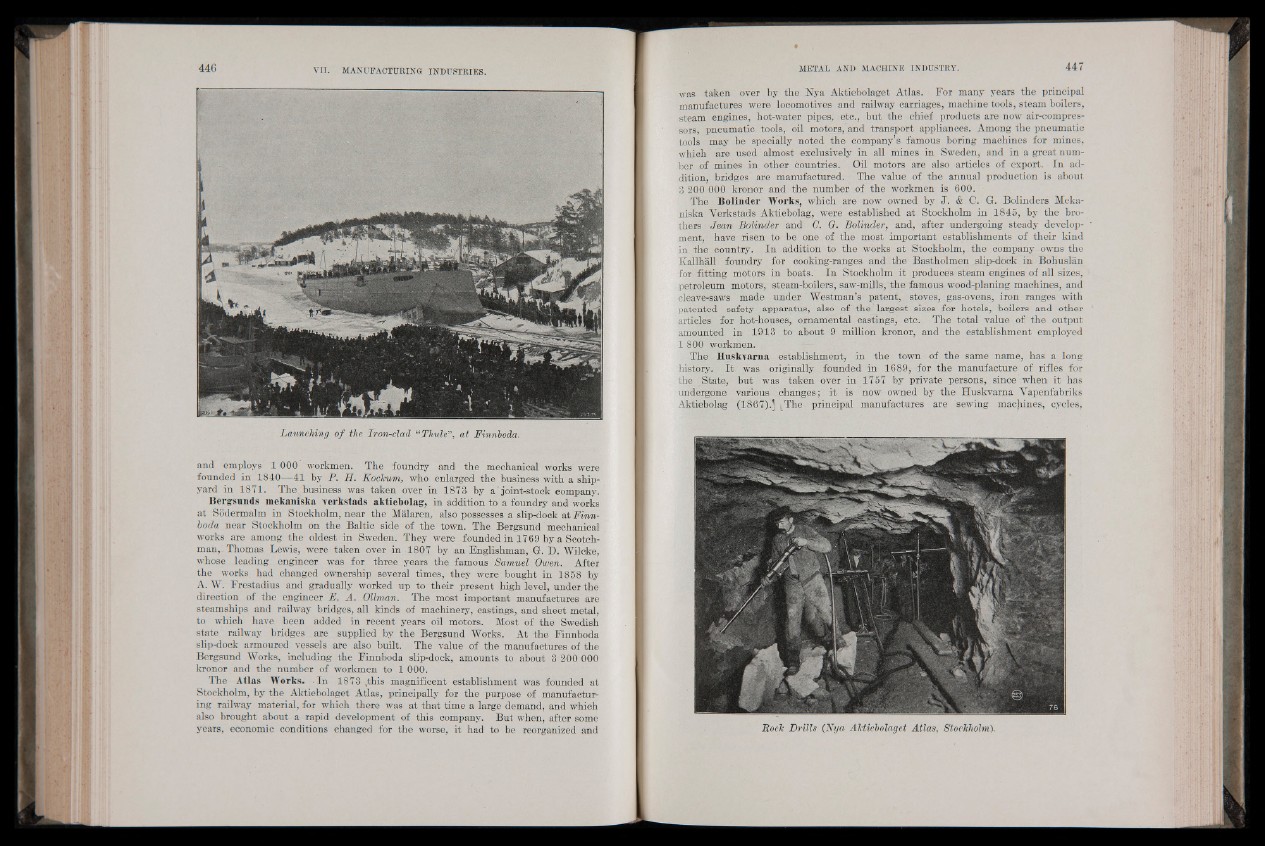
Launching o f the Iron-clad “Thule”, at Finnboda.
and employs 1 000 workmen. The foundry and the mechanical works were
founded in 1840—41 by P. H. Kockum, who enlarged the business with a shipyard
in 1871. The ^ business was taken over in 1873 by a ’ joint-stock company.
Bergsunds mekaniska verkstads aktiebolag, in addition to a foundry and works
at Sodermalm in Stockholm, near the Malaren, also possesses a slip-dock at Finnhoda
near Stockholm on the Baltic side of the town. The Bergsund mechanical
works are among the oldest in Sweden. They were founded in 1769 by a Scotchman,
Thomas Lewis, were taken over in 1807 by an Englishman, G. D. Wilcke,
whose leading engineer was for three years the famous Samuel Owen. After
the works had changed ownership several times, they were bought in 1858 by
A. W. Frestadius and gradually worked up to their present high level, under the
direction of the engineer E. A. Oilman. The most important manufactures are
steamships and railway bridges, all kinds of machinery, castings, and sheet metal,
to which have been added in recent years oil motors. Most of the Swedish
state railway bridges are supplied by the Bergsund Works. At the Finnboda
slip-dock armoured vessels are also built. The value of the manufactures of the
Bergsund Works, including the Finnboda slip-dock, amounts to about 3 200 000
kronor and the number of workmen to 1 000.
The Atlas Works. In 1873 ,this magnificent establishment was founded at
Stockholm, by the Aktiebolaget Atlas, principally for the purpose of manufacturing
railway material, for which there was at that time a large demand, and which
also brought about a rapid development of this company. But when, after some
years, economic conditions changed for the worse, it had to be reorganized and
was taken over by the Nya Aktiebolaget Atlas. For many years the principal
manufactures were locomotives and railway carriages, machine tools, steam boilers,
steam engines, hot-water pipes, etc., but the c h ie f. products are now air-compres-
sors, pneumatic tools, oil motors, and transport appliances. Among the pneumatic
tools may be specially noted the company’s famous boring machines for mines,
which are used almost exclusively in all mines in Sweden, and in a great number
of mines in other countries. Oil motors are also articles of export. In addition,
bridges are manufactured.- The value of the annual production is about
3 200 000 kronor and the number of the workmen is 600.
The Bolinder Works, which are now owned by J. & C. G. Bolinders Mekaniska
Verkstads Aktiebolag, were established at Stockholm in 1845, by the brothers
Jean Bolinder and C. O. Bolinder, and, after undergoing steady development,
have risen to be one of the most important establishments of their kind
in the country. In addition to the works at Stockholm, the company owns the
Kallhall foundry for cooking-ranges. and the Bastholmen slip-dock in Bohuslan
for fitting motors in boats. In Stockholm it produces steam engines of all sizes,
petroleum motors, steam-boilers, saw-mills, the famous wood-planing machines, and
cleave-saws made under Westman’s patent, stoves, gas-ovens, iron ranges with
patented safety apparatus, also of the largest sizes for hotels, boilers and other
articles for hot-houses, ornamental castings, etc. The total value ,of the output
amounted in 1913 to about 9 million kronor, and the establishment employed
1 800 workmen.
The Huskvarna establishment, in the town of the same name, has a long
history. It was originally founded in 1689, for the manufacture of rifles for
the State, but was taken over in 1757 by private persons, since when it has
undergone various changes; it is now owned by the Huskvarna Vapenfabriks
Aktiebolag (1867).] LThe principal manufactures are sewing machines, cycles,